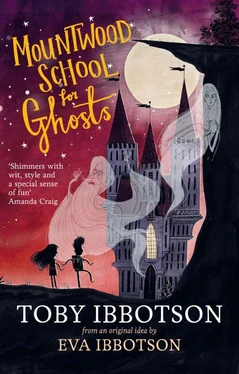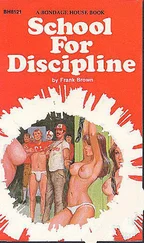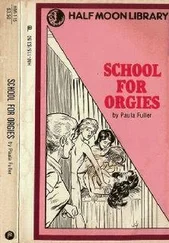Mr Jaros, sitting next to Mrs Wilder and trying to follow the proceedings, thought, Who could that be? I’m the only person with a business on Markham Street.
Then it struck him. In a rage he leaped out of his seat and started gesticulating and shouting things in Czech. This was actually a good thing, because if he had told Jack Bluffit in English what he was going to do to him (it included rope and rusty pitchforks) he would have been arrested.
Lord Ridget looked very startled. Then he grabbed his gavel and started banging it madly on the bench in front of him. ‘Stop it, silence, be quiet! This is not a public house.’
But Mr Jaros seemed unable to stop, until Mrs Wilder tugged at his sleeve and said gently, ‘Please, Fjodor, sit down.’
With a great effort Mr Jaros got a hold on himself and dropped back into his chair, sinking into a miserable silence with his head in his hands.
‘That didn’t do us much good,’ whispered Daniel.
‘You can say that again,’ Charlotte replied.
Now Jim Dawson stood up and moved to the front of the room. Daniel and Charlotte crossed their fingers. In a quiet voice he spoke of a centipede that little George had found under a waste bin in the park. It showed some interesting anomalies in the second and thirteenth segments.
Lord Ridget appeared to be in a coma.
Jack Bluffit turned in his chair and started signalling to someone sitting in the row behind him. A kind-looking gentleman with a moustache and a red waistcoat stood up.
‘Hello, Jim,’ he said.
‘Hello, Professor Manley,’ Jim replied.
‘I am not here entirely voluntarily,’ said the professor, ‘but as you know I am among other things Scientific Advisor to the Department of the Environment, and I must fulfil the duties that this entails.’
‘Of course, sir,’ said Jim. He liked and admired Professor Manley. Loved him really. They had spent many happy days on the moors together with their butterfly nets and collecting tins back when Jim had been a student.
‘Well then, I am aware that you are a resident of Markham Street, but now I speak to you as a fellow naturalist. Can you truthfully say, Jim, as a scientist and a man of honour, that the morphology of this centipede is of unique scientific interest?’
Their eyes met. There was a silence that seemed to go on for a long time, though it was probably only a few seconds.
‘No,’ said Jim.
The professor smiled in sad sympathy. Jim went back to his seat. Peter put an arm round his shoulders.
Daniel looked at Charlotte again. ‘From bad to worse,’ he said.
Now Bluffit was leaning forward in his seat, grimacing at Lord Ridget and making a chopping movement with his hand.
Lord Ridget peered at him. ‘What? Oh.’ He cleared his throat. ‘That seems to bring things to a conclusion.’
‘Not quite.’ A calm and very distinct voice spoke out. It came from Mrs Wilder, who now got to her feet, leaning on her stick. ‘I have something to add.’
Lord Ridget looked at Jack Bluffit, who had sunk back in his chair again. Bluffit shrugged his shoulders, as though to say, ‘What do I care? That old baggage can hardly make a difference.’
Daniel was thinking, ‘Oh no, please, don’t let her be made to look a fool.’
‘In Markham Park,’ Mrs Wilder began, ‘right in the middle, is a statue of General Sir George Markham, who as I am sure we are all aware fought and died for his country in a foreign land. However, perhaps not everyone knows that the park, and the statue, and the streets around the park, are built on what was once Markham land. For General Markham was not only a soldier. He cared about the people of this city, and he bequeathed the land to them, to be enjoyed as a place of rest and recreation in perpetuity. Well, maybe I’m getting old, but I thought that “in perpetuity” meant “forever”. But apparently it means something else. It means “until Jack Bluffit wants something”.’
At this the reporters, who had been looking very bored, sat up, grinned at each other and started scribbling in their notebooks.
‘Let’s see how Bluffit takes that,’ whispered one of them to his neighbour.
Jack didn’t take it very well. His face turned a very dangerous-looking purplish red colour, as though he had swallowed a large dumpling that had only got halfway to his stomach before wedging itself tight.
Mrs Wilder was just warming up. ‘Being interested in the arts,’ she said, ‘I am acquainted with a number of painters and sculptors, and I am assured on very good authority that a certain Mr Snyder has been making enquiries about the creation of a large equestrian statue, to stand at the centre of the new retail park. Mr Snyder is Jack Bluffit’s personal assistant, and need I add that the statue will not be a statue of Jack Bluffit’s personal assistant.’
At this Snyder’s head swivelled round on his thin neck and he stared intently at Mrs Wilder. His face was expressionless. Jack Bluffit’s neck was now puce with touches of crimson.
‘Is it possible,’ she said, ‘is it even thinkable, that the wanton destruction of a whole city neighbourhood has been set in train to satisfy one man’s personal vanity? I do not wish to accuse, of course. I merely ask.’
Jack Bluffit exploded out of his chair and roared, ‘That is slander, Lord Ridget. That is defamation of a faithful servant of this city. Strike it from the record. I’ll sue if this goes on.’
‘Er, I think that’s enough now,’ said Ridget to Mrs Wilder. He looked worriedly at Jack’s swollen features and tight collar, wondering if the council would build on his riverbank if Bluffit had a heart attack.
‘But I haven’t quite finished, my lord,’ said Mrs Wilder politely. ‘If I may just add some concluding remarks — on another topic,’ she added.
‘Oh, very well then. But keep off the personal stuff.’
‘Of course, my lord.’ She went on. ‘The Markham family have always been soldiers. General Markham’s son fought at Ypres, and his grandson was tragically killed during the defence of Tobruk in 1941, while hunting the Desert Fox.’
This impressed everybody in the room except Jack Bluffit; General Rommel, nicknamed the Desert Fox, was the most brilliant and wily commander of the German forces in the Second World War. Henry Markham must have been quite a man. Mrs Wilder was not being untruthful, she would never be that, but she had chosen her words carefully. Henry Markham had died in North Africa, and he was hunting the desert fox at the time, but it was a real desert fox that had been nosing around the dustbins outside the mess tent. Henry came from a good family and had had an expensive education, so he couldn’t resist slaughtering innocent animals; catching sight of the creature, he had grabbed a sub-machine gun, shouted, ‘Halloo!’ and ‘Tally-ho!’ and rushed out into the night, stepping on one of the land mines at the camp perimeter that he himself had laid only a few hours earlier.
‘I have been in communication with Henry Markham’s son William, now living in Marbella,’ continued Mrs Wilder, ‘and I would like to conclude by reading out his letter to me.’ She read:
Dear Mrs Wilder,
It comes as shock to me to hear that Markham Park is to be desecrated. I know that it meant a great deal to my great-grandfather, and he certainly intended it to remain untouched as a gift to the people of the city. It is such a lovely spot, is it not? What a shame that tradition and heritage should be brushed aside for commercial gain and so-called modernization. Is there really nothing to be done? Surely someone will step into the breach and save the park and its neighbourhood?
Yours sincerely,
William Markham, Bart.
There was a PS that said that if they took away the statue and sold it, then Mrs Wilder should send the money to him in Marbella, but she didn’t read out that bit.
Читать дальше












